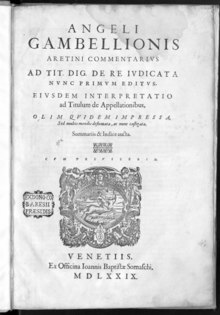
Back Сила на пресъдено нещо Bulgarian Res iudicata Czech Res iudicata German Cosa juzgada Spanish Autorité de la chose jugée French מעשה בית דין HE प्राङ्न्याय Hindi Jogerő Hungarian Cosa giudicata Italian 既判力 Japanese

Res judicata or res iudicata, also known as claim preclusion, is the Latin term for judged matter,[1] and refers to either of two concepts in common law civil procedure: a case in which there has been a final judgment and that is no longer subject to appeal; and the legal doctrine meant to bar (or preclude) relitigation of a claim between the same parties.
In the case of res judicata, the matter cannot be raised again, either in the same court or in a different court. A court will use res judicata to deny reconsideration of a matter. The doctrine of res judicata is a method of preventing injustice to the parties of a case supposedly finished but perhaps also or mostly a way of avoiding unnecessary waste of judicial resources. Res judicata does not merely prevent future judgments from contradicting earlier ones, but also prevents litigants from multiplying judgments.
It is similar to the concept of double jeopardy and non bis in idem in criminal law, but the protection in criminal prosecutions only bars an identical prosecution for the same offense, however, a different offense may be charged on identical evidence at a second trial, whereas res judicata precludes any causes of action or claims that may arise from the previously litigated subject matter. [2]
- ^ "res judicata". Oxford English Dictionary (Online ed.). Oxford University Press. (Subscription or participating institution membership required.)
- ^ D Nimmer (1981). Double Jeopardy Clause as a Bar to Reintroducing Evidence (From Criminal Law Review, 1981, P 301-320, James G Carr, ed.).
© MMXXIII Rich X Search. We shall prevail. All rights reserved. Rich X Search